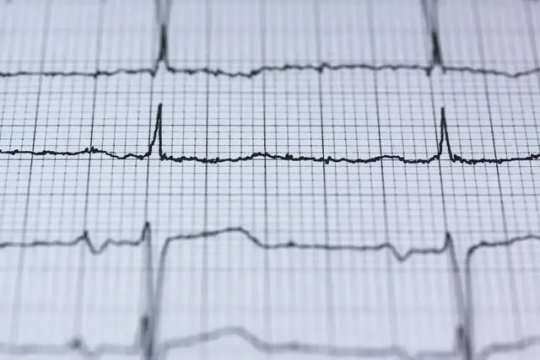#Holter
Explore tagged Tumblr posts
Text


he super angy about being holtered
168 notes
·
View notes
Text

recording for 24 hours
90 notes
·
View notes
Text

-Um, Tae? Is it really necessary for me to wear it? -Come on, Sae. This whole Phantom Thieves case got you on the edge of your health. You look exhausted. I need to know, if your heart is working correctly. This kind of stress can give you huge problems. You don't want Makoto to give you CPR, right? I need to know if you don't have any Long QTs. -Ugh, if you say so... -Besides Sae, you look cute in this one. Imagine, heart is a beautiful part of your body. All the electricity gathered there. Doesn't it make you fell love? *wink wink* PS: I am dumb. I forgot to give credit to original creator. Original creator: Tommy AKA Kingdukeee Source: https://danbooru.donmai.us/posts/4967242
#sae niijima#persona 5#heart#ekg#holter#holter monitor#ecg#ekg test#ecg test#female ekg#female ecg#cardiology
124 notes
·
View notes
Text

Got a Holter monitor on me again. If it only didn't itch so much...
#Heart#monitor#Holter#cardiologist#Thyroid#chronic illness#autoimmune disease#health journey#road to recovery#unstoppable#love and hugs#canadian girls#jennie's world
2 notes
·
View notes
Text
Understanding Holter Test Cost and Finding a Holter Test Near Me

When it comes to monitoring heart health, a Holter test is one of the most effective methods used by healthcare professionals. Many people seeking a thorough heart evaluation often find themselves asking, What is the Holter test cost or "Where can I find a Holter test near me In this blog, we will delve into the key aspects of Holter monitoring, its cost, and how to find a nearby provider for the test.
A Holter test, also known as Holter monitoring, is a portable device worn by a patient to continuously record the heart's electrical activity over 24-48 hours. It provides detailed information that can help doctors detect irregular heart rhythms (arrhythmias), heart attacks, or other heart-related conditions. Holter tests are often recommended when symptoms like dizziness, chest pain, or unexplained fainting occur, or when a patient’s standard electrocardiogram (ECG) doesn't capture the full picture of the heart's activity.
How Much Does a Holter Test Cost?
The cost of a Holter test can vary depending on several factors such as location, the healthcare provider, and whether the test is performed in a hospital or clinic setting. Generally, The cost of the Holter test ranges from 2,000 to 4,000 for 24 Hours. However, if the test is done in a specialized medical center or involves additional services such as consultation or a follow-up review with a cardiologist, the cost can rise.
Health insurance may cover the cost of a Holter test if it is deemed medically necessary, so it’s important to check with your insurance provider for specific coverage details. For those without insurance or for people in countries without widespread health insurance systems, finding affordable options can be challenging, but there are often low-cost clinics or government-funded health programs available.
Finding a Holter Test Near Me
If you're wondering, "Where can I find a Holter test near me?", there are several ways to locate a nearby facility that offers this service. The most convenient option is to start by asking your primary care physician for a referral. They can guide you to reliable locations where Holter tests are performed. Additionally, online search tools and health provider directories can help you find clinics, hospitals, or outpatient centers in your area that provide Holter monitoring.
It is recommended to research and compare the costs of a Holter test near you, as prices may vary depending on the facility and location. Some medical centers also offer free consultations or package deals that include the cost of the test and a follow-up appointment.
Conclusion
In conclusion, the Holter test cost can vary significantly, but understanding the factors involved can help you plan and manage expenses. If you're looking for a Holter test near me, consult with your healthcare provider or use online resources to find nearby clinics. No matter where you go, ensuring that you get proper care and monitoring for your heart health is the most important step. Be sure to inquire about all aspects of the process, from the cost to the procedure itself, to ensure that you're making an informed decision for your well-being.
0 notes
Text

Holter - Vlad The Impaler 09/11/2018
0 notes
Text
Understanding Palpitation with Holter Monitor

Palpitations, those fluttering sensations in the chest, can be a cause for concern and often leave individuals wondering about the underlying cause. In the realm of cardiac health, the advent of technology has brought forth a powerful diagnostic tool—Holter monitoring. This on-demand approach to heart monitoring has revolutionized the way we understand and address palpitations, offering insights that were once elusive.
Understanding Holter Monitoring
Holter monitoring, often referred to as Holter test or ambulatory electrocardiography, involves the continuous recording of a person’s heart activity for an extended period. Unlike a standard ECG performed in a clinic, a Holter monitor is worn by the individual, providing a comprehensive view of their heart’s performance during their daily activities.
The Significance of Holter Monitoring in Palpitations
1. Real-time Insights: Holter monitoring captures the heart’s electrical activity in real-time, allowing healthcare professionals to observe and analyze any irregularities precisely when palpitations occur. This instantaneous data retrieval is crucial for accurate diagnosis.
2. Extended Monitoring Periods: Unlike traditional ECGs that provide only a snapshot of heart activity, Holter monitoring extends over an extended period, typically 24 to 48 hours. This prolonged observation increases the chances of capturing sporadic palpitations that may not manifest during a brief clinical visit.
3. Holter Monitoring vs. ELR Test: While ELR (Event Loop Recorder) tests also capture irregular heart rhythms, Holter monitoring stands out for its continuous recording. ELR tests are triggered by specific events or symptoms, making them suitable for more infrequent palpitations. Holter monitoring, on the other hand, records the heart’s activity consistently, providing a comprehensive overview.
Engaging in the Heart’s Tale
Imagine your heart as a storyteller, narrating its journey through each beat. Holter monitoring allows us to delve into this narrative, uncovering the nuances of its performance. As the individual goes about their day, the Holter monitor silently collects data, creating a tapestry of information that healthcare professionals can later decipher.
Tips for a Successful Holter Monitoring Experience
1. Maintain Regular Activities: Encourage individuals undergoing Holter monitoring to maintain their regular activities. This ensures that the monitor captures a holistic picture of their heart’s performance during various scenarios.
2. Keep a Symptom Diary: Request individuals to keep a symptom diary, noting the times when they experience palpitations or any related sensations. This information aids healthcare professionals in correlating symptoms with recorded data.
Holter monitoring has emerged as a beacon of hope for those grappling with palpitations. Its on-demand nature, coupled with extended monitoring periods, provides a comprehensive understanding of the heart’s rhythm. As the availability of the Holter test in Gurugram becomes more widespread, individuals can take proactive steps towards heart health, ensuring that palpitations are not just a mystery but a puzzle solved through advanced technology.
0 notes
Text
Holter Monitoring
Holter monitoring is known as ambulatory ECG. It is a device that allows us to review a patient's heart activity for 24 hours. Every individual heartbeat is reviewed for that period.
0 notes
Text

Premium Holter Monitor Test Available at your Door Step with Delhi Cardio. Book your Holter Monitor Test with the Most Reputed Diagnostic Centre in Delhi. https://delhicardio.com/
0 notes
Text
Kalp Ritim Bozukluğu ve Belirtisi

Kalp ritim bozukluğu, kalbin normalden çok hızlı, çok yavaş veya düzensiz atması durumudur. Kalp ritim bozukluğu, kalbin kan pompalama işlevini bozarak çeşitli sağlık sorunlarına yol açabilir. Kalp ritim bozukluğunun nedenleri, belirtileri ve tedavi yöntemleri hakkında bilgi edinmek, kalp sağlığınızı korumak için önemlidir.
Kalp Ritim Bozukluğunun Nedenleri Nelerdir?
Kalp ritim bozukluğunun birçok nedeni olabilir. Bunlardan bazıları şunlardır: - Kalp hastalıkları: Kalbi besleyen damarlarda daralma veya tıkanma (koroner arter hastalığı), kalp kasında zayıflık (kardiyomiyopati), kalp kapaklarında darlık veya yetmezlik (kalp kapak hastalığı), doğuştan gelen kalp kusurları (konjenital kalp hastalığı) gibi durumlar, kalbin elektriksel sisteminde bozukluklara neden olabilir. - Yüksek tansiyon: Kan basıncının normalden yüksek olması, kalbin daha fazla çalışmasına ve yorulmasına sebep olur. Bu da kalbin ritmini etkileyebilir. - Şeker hastalığı (diyabet): Kan şekeri seviyesinin normalden yüksek olması, damarların sertleşmesine ve daralmasına yol açar. Bu da kalbe giden kan akışını azaltır ve ritm bozukluklarına neden olabilir. - Tiroid bezi hastalıkları: Tiroid bezi, vücudun metabolizmasını düzenleyen hormonlar salgılar. Tiroid bezinin fazla veya az çalışması, kalbin hızını değiştirebilir. - Stres, anksiyete, depresyon: Psikolojik faktörler, kalbin çalışmasını etkileyen hormonların salgılanmasına neden olabilir. Bu da kalbin ritmini bozabilir. - Elektrolit dengesizliği: Potasyum, kalsiyum, magnezyum gibi mineraller, kalbin elektriksel aktivitesinde rol oynar. Bu minerallerin seviyesinin normalden düşük veya yüksek olması, ritm bozukluklarına yol açabilir. - Bazı ilaçlar ve maddeler: Bazı reçeteli veya reçetesiz ilaçlar, bitkisel ürünler, alkol, sigara, kafein gibi maddeler, kalbin ritmini etkileyebilir.
Kalp Ritim Bozukluğunun Belirtileri Nelerdir?
Kalp ritim bozukluğu her zaman belirti vermeyebilir. Bazı durumlarda ise şu belirtiler görülebilir: - Çarpıntı: Kalbin çok hızlı veya düzensiz atması hissi. - Baş dönmesi veya bayılma: Kalbin yeterli kan pompalamaması sonucu beyne giden kan miktarının azalması. - Nefes darlığı: Kalbin yeterli kan pompalamaması sonucu akciğerlere giden kan miktarının azalması. - Göğüs ağrısı: Kalbin yeterli kan alamaması sonucu kalp kasının oksijensiz kalması. - Yorgunluk veya halsizlik: Kalbin yeterli kan pompalamaması sonucu vücudun enerji ihtiyacının karşılanamaması.

Kalp Ritim Bozukluğu
Kalp Ritim Bozukluğunun Tedavisi Nasıldır?
Kalp ritim bozukluğunun tedavisi, ritm bozukluğunun türüne, nedenine ve ciddiyetine bağlı olarak değişir. Bazı ritm bozuklukları ilaç tedavisi ile düzeltilebilirken, bazıları ise cerrahi müdahale gerektirebilir. Kalp ritim bozukluğunun tedavi yöntemleri şunlardır: - İlaç tedavisi: Ritm bozukluğunu düzenlemek, önlemek veya komplikasyonlarını azaltmak için kullanılan ilaçlardır. Anti-aritmik ilaçlar, beta blokerler, kalsiyum kanal blokerleri, dijital gibi ilaç grupları vardır. - Elektriksel kardiyoversiyon: Ritm bozukluğunu düzeltmek için kalbe elektrik şoku verilen bir işlemdir. Genellikle atriyal fibrilasyon gibi hızlı ve düzensiz ritm bozukluklarında uygulanır. - Ablasyon: Ritm bozukluğuna neden olan kalp dokusunu yok etmek için kullanılan bir yöntemdir. Kalbe kateter adı verilen ince bir tüp ile ulaşılır ve radyofrekans, lazer veya kriyoterapi gibi tekniklerle dokuya enerji verilir. - Kalp pili: Ritm bozukluğuna neden olan elektriksel uyarıların yetersizliği durumunda kullanılan bir cihazdır. Kalbin altında göğüs kafesine yerleştirilir ve kalbe elektrotlar aracılığıyla elektriksel uyarılar gönderir. - İmplante edilebilir kardiyoverter defibrilatör (ICD): Ritm bozukluğuna neden olan elektriksel uyarıların aşırılığı durumunda kullanılan bir cihazdır. Kalp pili gibi kalbin altında göğüs kafesine yerleştirilir ve kalbe elektrotlar aracılığıyla elektriksel uyarılar veya şoklar gönderir.
Kalp Ritim Bozukluğu Hangi Yaş Grubunda Daha Sık Görülür?
Kalp ritim bozukluğu her yaş grubunda görülebilir, ancak ileri yaşlarda daha sık ve daha ciddi olabilir. Özellikle 65 yaş üzerindeki kişilerde atriyal fibrilasyon denilen bir tür ritim bozukluğu riski artar. Atriyal fibrilasyon, kalbin kulakçıklarından kaynaklanan ve kalp atışlarını düzensiz hale getiren bir durumdur. Atriyal fibrilasyon, kalp yetersizliği, felç ve ani ölüm gibi komplikasyonlara yol açabilir. Bu nedenle, kalp ritim bozukluğu belirtileri yaşayan veya risk faktörleri olan kişilerin düzenli olarak kardiyolojik muayene olmaları önemlidir.

Kalp Ritim Bozukluğu
Hangi Belirtiler Daha Ciddidir?
Kalp ritim bozukluğunun belirtileri arasında hangilerinin daha ciddi olduğunu merak ediyorsunuz. Bu sorunun kesin bir cevabı yoktur, çünkü belirtilerin ciddiyeti ritim bozukluğunun türüne, nedenine ve süresine bağlı olarak değişebilir. Ancak genel olarak, aşağıdaki belirtiler daha ciddi bir ritim bozukluğuna işaret edebilir: - Bayılma: Kalbin yeterli kan pompalamaması sonucu beyne giden kan miktarının azalması, bilinç kaybına neden olabilir. Bayılma, kalbin durmasına veya çok yavaş atmasına (bradikardi) bağlı olabileceği gibi, kalbin çok hızlı atmasına (taşikardi) bağlı da olabilir. Bayılma, özellikle ventriküler taşikardi gibi hayatı tehdit eden bir ritim bozukluğunun belirtisi olabilir. - Göğüs ağrısı: Kalbin yeterli kan alamaması sonucu kalp kasının oksijensiz kalması, göğüs ağrısına neden olabilir. Göğüs ağrısı, kalp krizi veya anjina gibi ciddi kalp hastalıklarının habercisi olabilir. - Nefes darlığı: Kalbin yeterli kan pompalamaması sonucu akciğerlere giden kan miktarının azalması, nefes darlığına neden olabilir. Nefes darlığı, kalp yetersizliği veya pulmoner emboli gibi ciddi durumların belirtisi olabilir. Bu belirtilerden herhangi birini yaşarsanız, vakit kaybetmeden bir doktora başvurmanız gerekir. Kalp ritim bozukluğu tanısı için EKG, Holter monitörü, efor testi, elektrofizyolojik çalışma gibi yöntemler kullanılabilir. Tedavi seçenekleri ise ritim bozukluğunun türüne göre ilaç tedavisi, elektriksel kardiyoversiyon, ablasyon, kalp pili veya ICD implantasyonu gibi yöntemler olabilir. Kalp ritim bozukluğu tedavisi ile hayat kalitesi ve süresi artırılabilir. Kalp ritim bozukluğu, kalbin normalden çok hızlı, çok yavaş veya düzensiz atması durumudur. Kalp ritim bozukluğu, kalbin kan pompalama işlevini bozarak çeşitli sağlık sorunlarına yol açabilir. Kalp ritim bozukluğunun nedenleri arasında kalp hastalıkları, yüksek tansiyon, şeker hastalığı, tiroid bezi hastalıkları, stres, anksiyete, depresyon, elektrolit dengesizliği, bazı ilaçlar ve maddeler sayılabilir. Kalp ritim bozukluğunun belirtileri arasında çarpıntı, baş dönmesi veya bayılma, nefes darlığı, göğüs ağrısı, yorgunluk veya halsizlik sayılabilir. Kalp ritim bozukluğunun tedavisi ise ritim bozukluğunun türüne göre ilaç tedavisi, elektriksel kardiyoversiyon, ablasyon, kalp pili veya ICD implantasyonu gibi yöntemler olabilir. Kalp ritim bozukluğu her yaş grubunda görülebilir, ancak ileri yaşlarda daha sık ve daha ciddi olabilir. Özellikle 65 yaş üzerindeki kişilerde atriyal fibrilasyon denilen bir tür ritim bozukluğu riski artar. Atriyal fibrilasyon, kalp yetersizliği, felç ve ani ölüm gibi komplikasyonlara yol açabilir. Bu nedenle, kalp ritim bozukluğu belirtileri yaşayan veya risk faktörleri olan kişilerin düzenli olarak kardiyolojik muayene olmaları önemlidir. Kalp ritim bozukluğu ve belirtisi hakkında bilgi edinmek için bu makaleyi okudunuz. Umarım makale sizin için faydalı olmuştur. Kalp sağlığınızı korumak için sağlıklı bir yaşam tarzı benimsemeyi ve doktor tavsiyelerine uymayı unutmayın. Sağlıklı günler dileriz. Kalp ritim bozukluğu ile ilgilenen tıbbi branş kardiyolojidir. Kardiyoloji uzmanları, ritm bozukluğu tanısı ve tedavisi için gerekli tetkik ve işlemleri yaparlar. Bazı durumlarda ise elektrofizyoloji uzmanlarına da başvurulabilir. Kalp ritim bozukluğu hamilelikte görülebilen bir durumdur. Hamilelikte hormonal değişiklikler, kan hacminin artması, kalbin daha fazla çalışması gibi faktörler ritm bozukluğuna neden olabilir. Çoğu zaman zararsız olan bu durum bazen anne veya bebek için risk oluşturabilir. Bu nedenle hamilelikte çarpıntı, nefes darlığı, baş dönmesi gibi şikayetler yaşayan kadınların mutlaka doktora başvurmaları gerekir. Hamilelikte ritm bozukluğu tedavisi ise ilaç tedavisi, elektriksel kardiyoversiyon veya ablasyon gibi yöntemler olabilir. Ancak bu yöntemlerin anne veya bebek üzerindeki etkileri iyi değerlendirilmelidir. Kalp ritim bozukluğunu düzenlemek için kullanılan ilaçlar, antiaritmikler olarak adlandırılır. Bu ilaçlar, kalbin elektriksel aktivitesini etkileyerek ritm bozukluğunu önlemeye veya tedavi etmeye çalışırlar. Antiaritmik ilaçların farklı sınıfları vardır ve her sınıf farklı bir mekanizma ile çalışır. Antiaritmik ilaçların bazı örnekleri şunlardır: - Sınıf I ilaçlar: Sodyum kanallarını bloke ederek kalbin uyarılabilirliğini azaltırlar. Örneğin, lidokain, disopiramid, propafenon. - Sınıf II ilaçlar: Beta blokerler olarak da bilinirler. Kalbin sempatik sinir sistemine olan duyarlılığını azaltarak kalp hızını yavaşlatırlar. Örneğin, metoprolol, atenolol, propranolol12. - Sınıf III ilaçlar: Potasyum kanallarını bloke ederek kalbin uyarım süresini uzatırlar. Örneğin, amiodaron, sotalol, ibutilid. - Sınıf IV ilaçlar: Kalsiyum kanallarını bloke ederek kalbin uyarılabilirliğini ve iletimini azaltırlar. Örneğin, verapamil, diltiazem. - Sınıf V ilaçlar: Diğer veya bilinmeyen mekanizmalarla çalışan ilaçlardır. Örneğin, digoksin, adenozin. Antiaritmik ilaçların kullanımı doktor kontrolünde yapılmalıdır. Çünkü bu ilaçlar bazen istenmeyen yan etkilere veya ritm bozukluğunu kötüleştirebilecek durumlara neden olabilir. Bu nedenle, ritm bozukluğu olan veya risk altında olan kişilerin düzenli olarak kardiyolojik muayene olmaları ve doktor tavsiyelerine uymaları gerekir. Read the full article
0 notes
Text

Tim Holter Bruckner, 'The Joker', ''Spectrum'' #9, 2002
#Tim Bruckner#Tim Holter Bruckner#american artists#the joker#resin art#sculptures#dc comics#spectrum#batman
203 notes
·
View notes
Text

I'm sure Yoruichi would blush seeing Soi Fon like this. Original creator: BubbleTeeXL Source: https://www.deviantart.com/bubbleteexl/art/Soifon-Bleach-Thousand-Year-Blood-War-1124747220
#heart#female ekg#female ecg#woman ecg#woman ekg#ekg woman#female holter#woman holter#holter female#holter woman#bleach#soi fon#sui feng
69 notes
·
View notes
Text
Detect Hidden Heart Problems through Holter Monitoring

In today’s fast-paced world, heart problems can often go undetected until they become a major concern. But what if there was a way to detect hidden heart problems before they escalate into something serious? That’s where Holter monitoring, one of the essential services provided by “Holter on Demand,” comes into play. In this blog, we will explore how Holter monitoring can be a game-changer in identifying cardiac issues early, ensuring a healthier life.
What Is Holter Monitoring?
Holter monitoring, also known as a Holter test or ambulatory electrocardiography, is a non-invasive cardiac diagnostic service that allows continuous recording of a patient’s heart activity over a 24 to 48-hour period. The purpose of this test is to detect irregularities in heart rhythm that may not be captured during a routine visit to the doctor’s office.
How Does Holter Monitoring Work?
Holter monitoring involves wearing a small, portable device known as a Holter monitor, which is connected to electrodes placed on the chest. These electrodes record the electrical activity of the heart throughout the day and night. Patients are encouraged to maintain their regular activities during the monitoring period, providing a more accurate representation of their heart’s function in different situations.
Detecting Hidden Heart Problems
1. Identifying Irregular Heart Rhythms: One of the primary objectives of Holter monitoring is to detect irregular heart rhythms or arrhythmias. These abnormal heart rhythms can be fleeting and may not occur during a standard ECG at the doctor’s office. Holter monitoring’s continuous recording can capture these elusive irregularities.
2. Evaluating the Effect of Medication: For patients on medication for heart conditions, Holter monitoring can assess how well the medication is controlling their condition. This allows healthcare providers to make necessary adjustments to the treatment plan.
3. Assessing the Risk of Silent Ischemia: Silent ischemia is a condition where the heart doesn’t receive enough oxygen-rich blood, leading to damage without noticeable symptoms. Holter monitoring can help identify episodes of silent ischemia, allowing early intervention to prevent a heart attack.
Holter on Demand– The Convenience Factor
Holter on Demand offers the best and unique service to its patients, This service enables patients to undergo Holter monitoring from the comfort of their own homes, eliminating the need for an extended hospital stay. Patients can continue with their daily routines, making it more convenient and less disruptive to their lives
Holter monitoring stands out as a valuable tool for detecting hidden heart problems. By continuously recording heart activity over an extended period, it can identify irregular heart rhythms, assess medication effectiveness, and even uncover silent ischemia. With “Holter on Demand”, this critical diagnostic service is now more accessible than ever.
Don’t wait for heart problems to manifest as severe symptoms. Consider the benefits of Holter monitoring as part of your routine cardiac health checkup. Remember, early detection can be the key to a healthier and longer life.
If you suspect any cardiac issues or simply want to stay proactive about your heart health, reach out to “Holter on Demand” for comprehensive cardiac diagnostic services, including Holter monitoring. Your heart deserves the best care, and Holter monitoring can help ensure just that.
0 notes
Text








Vladimir Nabokov Letters to Vera / pinterest / @heavensghost WHAT IS LOVE IF NOT THE SHARING OF SOMETHING BEAUTIFUL? / Young Royals (2021-) cr. Lisa Ambjörn, Lars Beckung, Camilla Holter / Kiersten White The Chaos of Stars / Alida Moon / Blue (2002) dir. 安藤尋 Hiroshi Ando / Haruki Murakami Norwegian Wood
#on love#on falling in love#web weave#web weaving#poetry compilation#poetry parallels#vladimir nabokov#letters to vera#young royals#prince wilhelm#simon eriksson#wilhelm x simon#lisa ambjörn#lars beckung#camilla holter#kiersten white#the chaos of stars#alida moon#blue movie#blue jmovie#hiroshi ando#haruki murakami#norwegian wood#japanese movie#words#poem#spilled poetry#spilled thoughts#spilled ink#dark academia
583 notes
·
View notes
